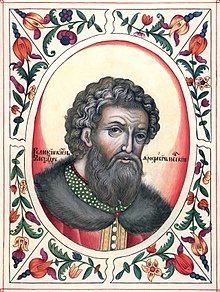
Back Aleksander Nefski AF ألكسندر نيفسكي Arabic الكسندر نيفيسكى ARZ Alejandro Nevski AST Aleksandr Nevski AZ الکساندر نوسکی AZB Александр Невский BA Аляксандр Яраславіч Неўскі BE Аляксандар Неўскі BE-X-OLD Александър Невски Bulgarian
| Alexander Nevsky | |
|---|---|
 Portrait in the Tsarsky titulyarnik, 1672 | |
| Prince of Novgorod | |
| Reign | 1236–1240 |
| Predecessor | Yaroslav V |
| Successor | Andrey I |
| Reign | 1241–1256 |
| Predecessor | Andrey I |
| Successor | Vasily I |
| Reign | 1258–1259 |
| Predecessor | Vasily I |
| Successor | Dmitry I |
| Grand Prince of Kiev | |
| Reign | 1249–1263 |
| Predecessor | Yaroslav III |
| Successor | Yaroslav IV |
| Grand Prince of Vladimir | |
| Reign | 1252–1263 |
| Predecessor | Andrey II |
| Successor | Yaroslav III |
| Born | 13 May 1221 Pereslavl-Zalessky, Vladimir-Suzdal |
| Died | 14 November 1263 (aged 42) Gorodets, Vladimir-Suzdal |
| Burial | Alexander Nevsky Lavra, Saint Petersburg, Russia |
| Spouse | Alexandra of Polotsk |
| Issue more... | Dmitry Alexandrovich Andrey Alexandrovich Daniil Alexandrovich |
| House | Rurik |
| Father | Yaroslav II of Vladimir |
| Religion | Eastern Orthodox |
Alexander Yaroslavich Nevsky[1] (Russian: Александр Ярославич Невский; IPA: [ɐlʲɪˈksandr jɪrɐˈsɫavʲɪtɕ ˈnʲɛfskʲɪj] ; monastic name: Aleksiy;[2] 13 May 1221[3] – 14 November 1263) was Prince of Novgorod (1236–1240; 1241–1256; 1258–1259), Grand Prince of Kiev (1249–1263), and Grand Prince of Vladimir (1252–1263).[4]
Commonly regarded as a key figure in medieval Russian history,[5] Alexander was a grandson of Vsevolod the Big Nest and rose to legendary status on account of his military victories in northwestern Russia over Swedish invaders in the 1240 Battle of the Neva,[a] as well as German crusaders in the 1242 Battle on the Ice.[7] He preserved Eastern Orthodoxy, agreeing to pay tribute to the powerful Golden Horde. Metropolitan Macarius of Moscow canonized Alexander Nevsky as a saint of the Russian Orthodox Church in 1547.[8]
- ^ "Благоверный князь Алекса́ндр (в схиме Алекси́й) Невский". azbyka.ru (in Russian). Archived from the original on 26 August 2021. Retrieved 26 August 2021.
- ^ Православные храмы Москвы. Изд. Московской Патриархии. 1988. p. 21.
- ^ V.A. Kuchkin (1986). О дате рождения Александра Невского [About the Birthdate of Alexander Nevsky]. Вопросы истории [Questions of History] (in Russian) (2): 174–176. Archived from the original on 22 February 2015.
- ^ Morby, John E. (2002). Dynasties of the world: a chronological and genealogical handbook. Oxford: Oxford University Press. p. 168. ISBN 9780198604730.
- ^ Välimäki 2022, xv, "...he became one of the great heroes of Russian history, a defender of Russia against alien forces. This was, however, a later development".
- ^ Selart 2015, p. 144.
- ^ Nazarova 2006, p. 42, "... renowned for resisting the attacks of German and Swedish crusaders against northwestern Russia".
- ^ Raffensperger & Ostrowski 2023, p. 125.
Cite error: There are <ref group=lower-alpha> tags or {{efn}} templates on this page, but the references will not show without a {{reflist|group=lower-alpha}} template or {{notelist}} template (see the help page).